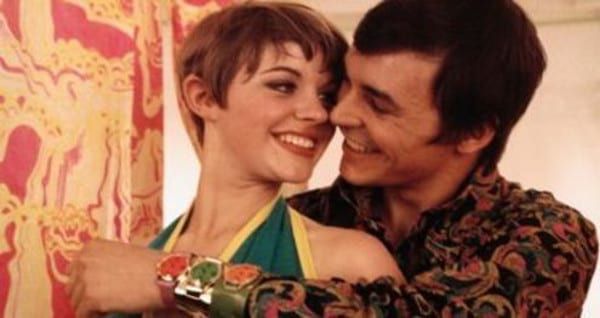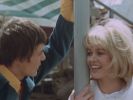Eye For Film >> Movies >> Here We Go Round The Mulberry Bush (1967) Film Review

The DVD release of this Swinging Sixties comedy has, sadly, acquired a timely note with the recent death of its director Clive Donner. But it provides a good opportunity to re-examine a key film from what was undoubtedly the high point of his career.
A film fan ever since his father, a concert violinist, introduced him to Michael Powell while recording music for The Life And Death Of Colonel Blimp, the young Donner learnt his trade as an editor, then contract director, in the still thriving British film industry of the Forties and Fifties.

He sensed a change in the zeitgeist early on and the backroom technician of stalwarts such as Scrooge and Genevieve started to make films that dealt with the emerging youth culture. The Secret Place, his 1957 debut, concerns a boy who becomes involved with jewel thieves and was shot on location in the East End, while Some People (1962) was a surprise hit that transcended its origins as a plug for the Duke of Edinburgh’s Award Scheme.
He was also gaining a reputation as a commercials director and had become known to several early Sixties luminaries. When his friend Harold Pinter asked him to direct a film version of his stage hit The Caretaker, the finance for a movie of three blokes talking at cross purposes in a front room proved unsurprisingly hard to find. But a consortium of famous names, such as Peter Sellers, Richard Burton and Noel Coward, put the money up and the result was a striking and critically acclaimed transfer of Pinter’s elliptical, endlessly rewarding masterpiece.
An acerbic black comedy, Nothing But The Best, was followed by his best known work, What’s New, Pussycat! – and here’s where I put my critical hat on to declare that although it may be a perfect time capsule of Sixties filmmaking it is also a loud, unfunny mess, suffused with a desperate desire to seem hip and with-it that looks impossibly dated today. Several critics at the time agreed, as did Woody Allen who disowned the screenplay, but Donner was certainly in demand, hired to go to America and direct the film of a Broadway comedy, Luv. Despite starring Jack Lemmon and Peter Falk the play flopped and Donner found himself searching for a new project.
Here We Go Round The Mulberry Bush was an inspired next choice. It was based on a novel by Hunter Davies, one of the new generation of working-class British writers, that dealt with the adventures of a new phenomenon – the sexually and socially liberated young lad. Budget restrictions, however, meant that the book’s original setting of Carlisle (Davies’ home town) was replaced by Stevenage, one of the post-war “new towns” that incorporated ground-breaking ideas in architecture and social planning.
It makes a perfect setting for the opening scene. Jamie (Barry Evans), a sixth-former earning extra money as a supermarket delivery boy, while he waits to hear if he’s been accepted for university, rides his bike along the ring roads and smart new estates of a quintessential “modern” landscape, while the theme song by Traffic (specially composed for the film) plays in the background and he delivers a direct-to-camera monologue about his hopes and fears.
These revolve around “getting out of this place” and, more pressingly, sampling the new spirit of permissiveness first-hand by losing his virginity as soon as possible. The central premise wasn’t new – John Schlesinger’s 1963 film version of Keith Waterhouse’s novel Billy Liar springs immediately to mind – but the sunlit cinematography, striking backdrops and general air of optimism mark it out from the grim and grimy British New Wave that had dominated thus far.
But like Billy, Jamie has plenty of potential conquests to choose from. There’s Mary (Judy Geeson), the girl he’s worshipped from afar since junior school, next-door neighbour Linda (Adrienne Posta), church youth worker Paula (Sheila White), and posh-but-liberated Caroline (Angela Scoular). Their burgeoning relationship takes up a fair chunk of the film and gives Donner a chance to satirise the “bright young things” of the public school set, who, unlike grammar school boy Jamie, have enough time and money to rebel safely before settling down to married life, or getting a job in daddy’s firm.
He also has a lot of fun at the expense of Caroline’s family, pillars of the new community, with their foreign au pair and wine connoisseur pretensions. Casting the impeccably patrician Denholm Elliot as the pompous, but equally priapic, paterfamilias seems to be Donner’s way of suggesting that British society hasn’t changed that much.
Jamie soon tires of this new world, and yet still feels unfulfilled. Then Mary happens to come along… again.
It’s a bright and breezy enough time capsule of a film, with a few good lines and pithy observations. But it meanders along far too much, content to linger over its background architecture, or track Jamie and his latest girlfriend as they wander through nearby fields. There’s a lack of dramatic tension, which the Brit New Wave classics, for all their easily satirised grittiness, had in spades.
There’s no sense that Jamie has to struggle against anything, or that he won’t have options for his future, and there’s a bit of mild fun at the expense of his parents, reading Dickens at the kitchen table and buying table lamps with Daily Express coupons for “self-improvement.” But there’s never any sense that they don’t want him to move out and on, or, indeed, have a bit of fun with his “young ladies” on the way.
This may be a more realistic take on the average Sixties lad than the tortured, thwarted anti-heroes in the films of Schlesinger, Karel Reisz and Lindsay Anderson, but it doesn’t make for compelling drama. Also the comic elements are uncomfortably caught between Donner’s desire to send up the era, even as he’s celebrating it, and a much older, cruder and less rewarding national tradition. There are times when you could be watching Carry On Swinging, as yet another group of randy young boys goes “Phwooarr!”, while yet another mini-skirted dolly bird totters by – even Sid James wouldn’t have been so ungallant as to refer to an irritatingly over-affectionate girlfriend as a “stupid bitch”, which Jamie does in a jarring reminder that some attitudes don’t change.
The “daring” use of swear words and a bit of nudity that caused the censors to intervene, make Here We Go... undoubtedly a film of its period, though it’s a million times better than the Confessions of... and Adventures of... (also starring Evans) series, which followed. And its better moments possess a good-natured optimism and several arresting images.
The acting is pretty good, too. Geeson is a winning combination of innocence and knowingness, eventually proving herself much more mature than Jamie, while Scoular (a two-time Bond girl, in the witless spoof version of Casino Royale and the underrated On Her Majesty’s Secret Service) transcends a “scatty posh girl” stereotype to make Caroline warm, funny and believable. There is a host of daytime TV and RSC stalwarts in supporting roles as well, most notably Christopher Timothy as Jamie’s Jack-the-lad best mate, and, in the lead, Evans invests a fairly blank (and in some ways unlikeable) character with charm and energy.
Reviewed on: 08 Oct 2010

















